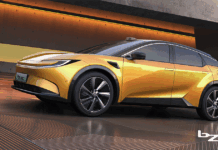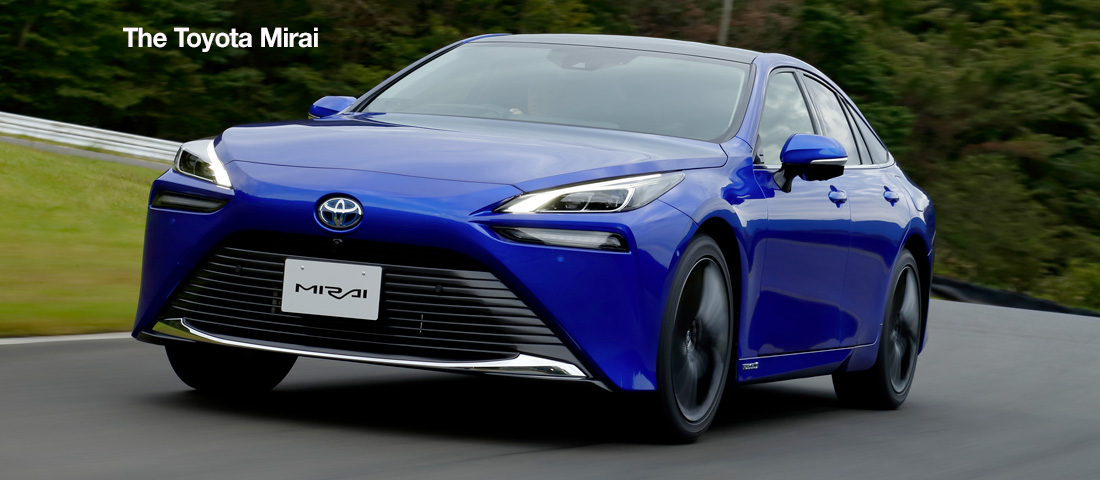The Hydrogen Vehicles of 2023
We should be talking about Hydrogen powered vehicles. They burn zero fossil fuels, produce zero pollution or greenhouse gases, run on the same chemical reaction that powers rockets, and gets twice as much mileage as a Tesla.
That’s the promise of Hydrogen — the most abundant resource in the world, now harnessed to power a vehicle that has a much less harmful effect on the environment overall. And yes, such vehicles are available today. Surprised? You shouldn’t be.
The fact is, most of us in the general public have never heard of a Hydrogen-powered vehicle. In the rush to populate the roads with electrics, the fuel cell battery has been somewhat left behind. — yet experts believe that hydrogen fuel cell cars will not only catch EV sales, but surpass them in the not-so-distant future. Here’s a look at this exciting new concept in propulsion.
What Is A FCV?
A hydrogen car, also known as a fuel cell vehicle (FCV), uses hydrogen as its fuel source. Unlike traditional battery-powered electric vehicles, which store energy in a battery that must be charged, hydrogen cars generate electricity on-board the vehicle through electrolysis, which splits hydrogen into its component parts of hydrogen ions and electrons. The hydrogen ions are then combined with oxygen from the air in a fuel cell to produce electricity, which powers the vehicle’s electric motor. The only byproduct of this process is water vapor, which is expelled through the vehicle’s tailpipe. This makes hydrogen cars a zero-emissions vehicle, producing no harmful pollutants or greenhouse gas emissions.
Sounds like a winning technology, yet widespread adoption of hydrogen cars is still limited by the availability of hydrogen fueling infrastructure, high costs, and the energy required to produce hydrogen from other sources. Once those hurdles are scaled, Hydrogen could deliver a more sustainable future for the automotive industry.
How Hydrogen Can Power Your Vehicle
Hydrogen fuel cell cars are powered by an electric motor and are therefore classified as e-cars. The common abbreviation is FCEV, short for “Fuel Cell Electric Vehicle,” in contrast to a BEV or “Battery Electric Vehicle.” There is one central difference between hydrogen fuel cell cars and other electric vehicles – hydrogen cars produce the electricity themselves. Unlike fully electric or plug-in hybrid vehicles, the Hydrogen vehicle doesn’t get its power from a built-in battery that can be charged from an external power source. Instead, hydrogen cars effectively have their own super-efficient “power plant” on board: the fuel cell.
Simple, Reliable Power
Hydrogen fuel cell vehicles (FCVs) work by using hydrogen as a fuel source to generate electricity and power the vehicle’s motor. Here’s how the process works:
- Hydrogen storage: Hydrogen is stored in high-pressure tanks onboard the vehicle.
- Fuel cell stack: A fuel cell stack converts the hydrogen into electricity through a process called electrolysis. In this process, hydrogen ions and electrons are separated, with the ions flowing through a membrane to the negative electrode (the cathode), and the electrons flowing through an external circuit to the positive electrode (the anode).
- Electricity generation: At the cathode, the hydrogen ions combine with oxygen from the air to produce water and heat, while at the same time generating an electric current. This current is used to power the electric motor that drives the wheels of the vehicle.
- Exhaust: The only byproduct of this process is water vapor, which is expelled through the vehicle’s tailpipe.
By comparison, traditional internal combustion engines rely on gasoline to create heat and pressure, which drives the engine’s pistons and ultimately powers the wheels. FCVs offer several advantages over traditional internal combustion engines, including improved efficiency, lower emissions, and a quiet and smooth driving experience.
The Fuel Cell Power: Reverse Electrolysis
In fuel cell technology, a process known as reverse electrolysis takes place, in which hydrogen reacts with oxygen in the fuel cell. The hydrogen comes from one or more tanks built into the FCEV, while the oxygen comes from the ambient air. The only results of this reaction are electrical energy, heat and water, which is emitted through the exhaust as water vapor. The electricity generated in the fuel cell of a hydrogen engine can take two routes, depending on the demands of the specific driving situation. It either flows to the electric motor and powers the FCEV directly or it charges a battery, which stores the energy until it’s needed for the engine. This battery, known as a Peak Power Battery, is significantly smaller and therefore lighter than the battery of a fully electric car, as it’s being constantly recharged by the fuel cell. Like other e-cars, hydrogen vehicles can also recover or “recuperate” braking energy. The electric motor converts the car’s kinetic energy back into electrical energy and feeds it into the back-up battery.
Hydrogen Enables Ultra-Fast Charging
One of the biggest advantages is the quick charging time. Depending on the charging station and battery capacity, fully electric vehicles currently require between 30 minutes and several hours for a full charge. The hydrogen tanks of fuel cell cars, on the other hand, are full and ready to go again in less than five minutes. For users, this brings vehicle availability and flexibility into line with those of a conventional car.
Currently, the biggest shortcoming of hydrogen fuel cell cars is the sparsity of options for refueling. A hydrogen engine is refueled at special fuel pumps, which in the future will probably find their way into ordinary service stations. As things stand, however, there are still very few refueling stations for hydrogen-powered cars. At the end of 2019 there are only around 40 in the U.S.
Super Clean, Super Abundant
Alternative propulsion systems, like Hydrogen, are designed to reduce the emission of pollutants, in particular climate-harming CO2, but also other noxious gases such as nitrous oxide. The exhaust gas from a hydrogen engine consist of pure water vapor. Hydrogen fuel cell technology is therefore locally emission-free. This means it keeps the air clean in cities, but does it protect the climate at the same time? We have to understand first that Hydrogen production requires electrical energy to break water down into hydrogen and oxygen, via the process of electrolysis. If the electricity used comes fossil fuels, hydrogen fuel cell cars are no different in regard to their impact on the environment from other electric vehicles. And there’s one more advantage: Hydrogen can be produced at times when there is an oversupply of electricity from renewable energy sources when the wind or solar energy currently produced is not otherwise used. The potential for this is huge.
The Hydrogen Council, a global initiative of leading energy, transport and industry companies, is convinced that hydrogen can make an important contribution to sustainable mobility alongside BEVs in the future – provided the necessary hydrogen infrastructure is in place and offers a good price for hydrogen, and the price of the vehicles falls. In those circumstances, hydrogen fuel cell cars can be the zero-emissions technology that allows users to maintain the flexible driving habits they are accustomed to. The council sees hydrogen not only as a sustainable future means of propulsion for fuel cell vehicles, but also as a clean energy source for heating, electricity and industry.
Hydrogen Vehicles Currently Available
Yes, there are Hydrogen vehicles available — and on the road today. They include The BMW iX5, The Honda CR-V FCEV, the Ineo Grenadier hydrogen FCEV, Hyundai Nexo (announced for 2024), Hyundai Staria Fuel Cell, Kia KK/Hyundai FK, Toyota Mirai, Honda Clarity Fuel Cell, Kia Carnival FCEV, Land Rover Defender Fuel Cell Vehicle, Range Rover FCEV and the Toyota Hilux hydrogen. Note the absence of U.S. automakers on that list.
So Why Aren’t We Talking About Hydrogen Cars?
Hydrogen fuel cell technology has the potential to make ecologically sustainable mobility possible. However, according to BMW’s expert Axel Rücker, this would above all require the use of renewable energy sources when producing the hydrogen used, as well as an expansion of the technological infrastructure in order to shorten transportation distances.
















